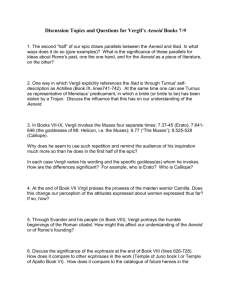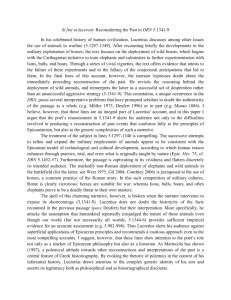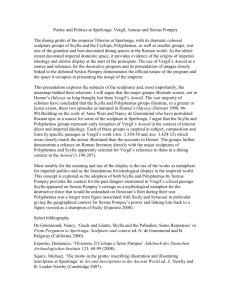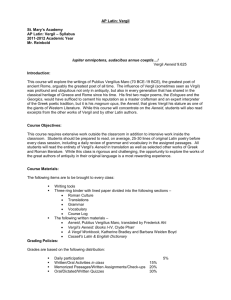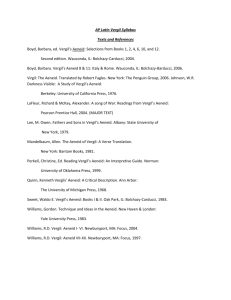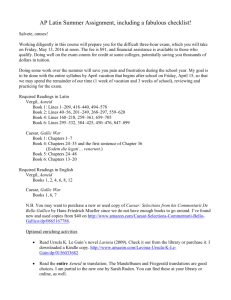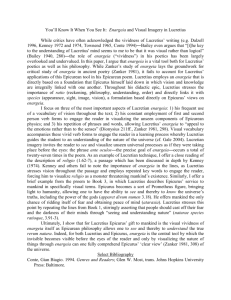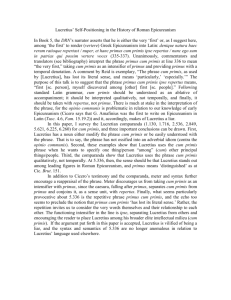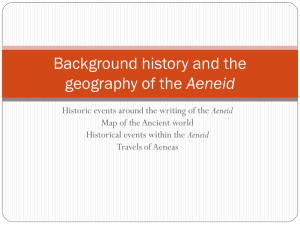Poets, proems, and the problem of politics: Lucretian ataraxia and
advertisement
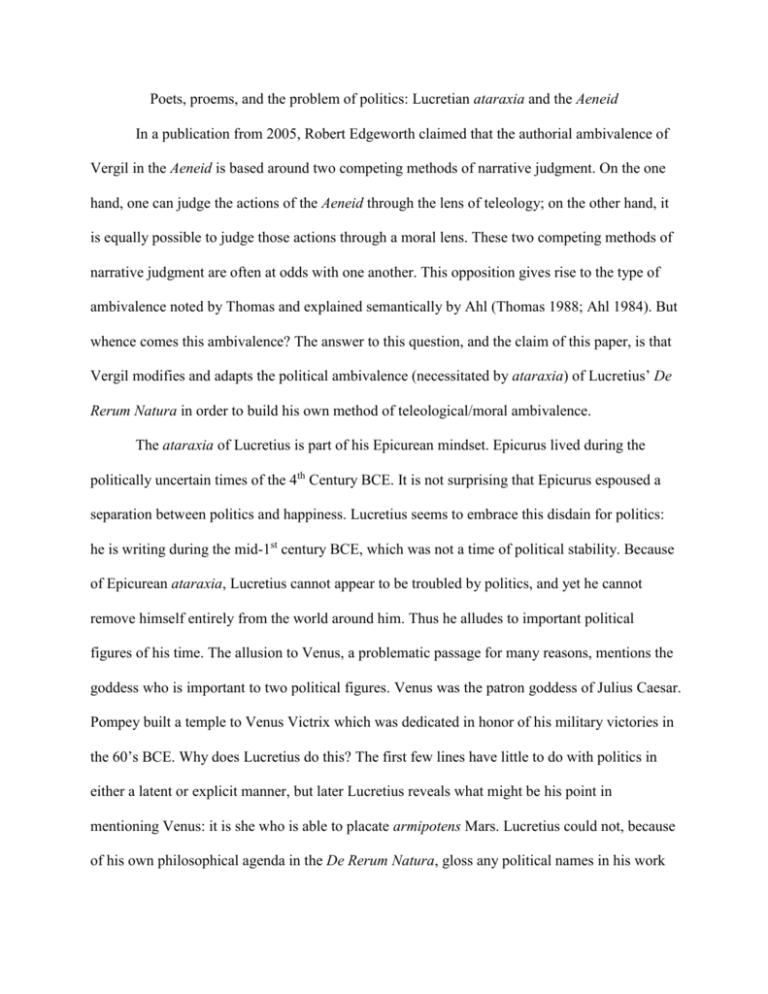
Poets, proems, and the problem of politics: Lucretian ataraxia and the Aeneid In a publication from 2005, Robert Edgeworth claimed that the authorial ambivalence of Vergil in the Aeneid is based around two competing methods of narrative judgment. On the one hand, one can judge the actions of the Aeneid through the lens of teleology; on the other hand, it is equally possible to judge those actions through a moral lens. These two competing methods of narrative judgment are often at odds with one another. This opposition gives rise to the type of ambivalence noted by Thomas and explained semantically by Ahl (Thomas 1988; Ahl 1984). But whence comes this ambivalence? The answer to this question, and the claim of this paper, is that Vergil modifies and adapts the political ambivalence (necessitated by ataraxia) of Lucretius’ De Rerum Natura in order to build his own method of teleological/moral ambivalence. The ataraxia of Lucretius is part of his Epicurean mindset. Epicurus lived during the politically uncertain times of the 4th Century BCE. It is not surprising that Epicurus espoused a separation between politics and happiness. Lucretius seems to embrace this disdain for politics: he is writing during the mid-1st century BCE, which was not a time of political stability. Because of Epicurean ataraxia, Lucretius cannot appear to be troubled by politics, and yet he cannot remove himself entirely from the world around him. Thus he alludes to important political figures of his time. The allusion to Venus, a problematic passage for many reasons, mentions the goddess who is important to two political figures. Venus was the patron goddess of Julius Caesar. Pompey built a temple to Venus Victrix which was dedicated in honor of his military victories in the 60’s BCE. Why does Lucretius do this? The first few lines have little to do with politics in either a latent or explicit manner, but later Lucretius reveals what might be his point in mentioning Venus: it is she who is able to placate armipotens Mars. Lucretius could not, because of his own philosophical agenda in the De Rerum Natura, gloss any political names in his work (with the exception of his patron, Memmius). Lucretius could, however, allusively refer to political figures. This act of allusion leaves room for multiple interpretations (e.g. is Venus a metaphor for love rather than a metaphor for two political figures?), for an allusion is only a depiction of the real and is not the real itself. In other words, an allusion, to the degree that it is allusive, is ambivalent because it conjures many competing poetic realities. Vergil employs a variation of the allusive, ataraxia-based ambivalence of Lucretius. It is striking that Vergil begins his epic with arma rather than virum: this seems out of narrative order since the “Odyssey” half of the Aeneid comes first. Why is primary position granted to warfare? Is warfare the more generic topic of epic? Or might Vergil on some level, whether consciously or unconsciously is inconsequential, be alluding to the first use of the word armum in the De Rerum Natura? If the latter, then the Lucretian intertext gives an ambivalent tone to the first line of Vergil’s epic. This paper will try to engage what is by now the somewhat exhausted topic of Vergilian interpretation. This paper does not hope to answer the question of intent; interpretation of authorial intent is extremely difficult because those intentions are completely irretrievable in most cases. However, an intertextual reading of Vergil via Lucretian ataraxia can lead us to new insights into the ambivalence of the Aeneid. Works cited Ahl, Frederick. “The Art of Safe Criticism in Greece and Rome.” AJP 105.2 (1984): 174-208. Austin, R.G. Aeneidos Liber Primus. Oxford: Oxford University Press. 1971. Bartsch, Shadi. Ideology in Cold Blood. Cambridge: Harvard University Press. 1997. Conte, Gian Biagio. The Rhetoric of Imitation: Genre and Poetic Memory in Virgil and Other Latin Poets. Edited by Charles Segal. Ithaca: Cornell University Press. 1986. Dyson, Julia T. “Fluctus Irarum, Fluctus Curarum: Lucretian Religio in the Aeneid.” AJP 118.3 (1997): 449-57. Edgeworth, Robert Joseph. “The silence of Vergil and the end of the Aeneid.” Vergilius 51 (2005): 3-11. Fowler, D.P. “Lucretius and Politics” in Philosophia Togata: Essays on Philosophy and Roman Society. Barnes, J. and Griffin, M. (eds). Oxford: Oxfrod University Press. 1989: 120-50. Grebe, Sabine. “Augustus’ Divine Authority and Vergil’s Aeneid.” Vergilius 50 (2004): 35-62. Hinds, Stephen. Allusion and intertext: Dynamics of appropriation in Roman poetry. Cambridge: Cambridge University Press. 1998. Leonard, William Ellery; Smith, Stanley Barney. T. Lucreti Cari De Rerum Natura. Madison: University of Wisconsin Press. 1942. Putnam, M.C.J. The Poetry of the Aeneid. Cambridge: Harvard University Press. 1966. Stahl, Hans-Peter. “Aeneas—an ‘Unheroic” Hero?” Arethusa 14.1 (1981): 157-77. Thomas, Richard F. “Tree Violation and Ambivalence in Virgil.” TAPA 118 (1988): 261-73.
